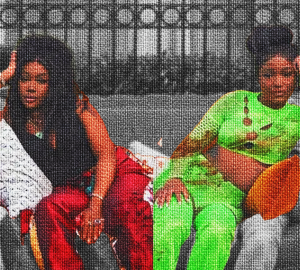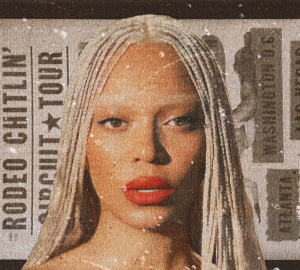Writer’s Corner: ‘An Ode to Irrelevant Technology’
The Writer’s Corner features poetry, essays, short stories, satire and various fiction and non-fiction from SCAD Atlanta students. To submit your own work for the Writer’s Corner, email features@scadconnector.com.

An Ode to Irrelevant Technology by Sarah Bradley
Radio
My favorite part of elementary school was the ride home. My brothers received their licenses one summer, and they both become responsible for taking me around. Rides to and from school were always informative. They taught me how to kick people in the crotch if they tried to touch me. They taught me how to egg a house, how to shoot a BB gun, how to break the speed limit.
More than anything, they taught me about music. The tiny speakers of my brothers’ rusted out ’80s Lexus gave me all the classics of early 2000 alt rock — Linkin Park, Pearl Jam, The Flaming Lips, Cage the Elephant, Neutral Milk Hotel, Matchbox 20 and “Californication.” Nirvana also made an appearance every now and again.
By the end of 8th grade I knew the entire Red Hot Chili Pepper discography by heart. That year my brother moved out, I got an iPod, and that was that. The rides to school were over. It was the end of an era. Still, when I feel heaviness in my heart. I think of how “Californication” sounded inside my brother’s ’80s Lexus as it screamed down a golden highway. I think about how everyone I cared about was sitting close enough to touch.
I can say without a hint of irony that radio has been my friend. The first time I kissed a boy, it was there. When that boy later broke my heart, it was there then too. The first time I had sex, or when I chose my friends — the times I’ve felt loneliness and wondered why, the radio was there.
The serendipity of the radio is something you could never get with an MP3. The fact you don’t choose, that’s its random, is what makes it special. It’s when the radio gives you what you needed in the moment you needed it. There are times I have been broken, and the radio gave me “Do You Realize?” When I was homesick, it gave me “Don’t Mess around with Jim.” When I needed different answers than the ones I was given, it gave me NPR. When I would ruminate on injustice in the world, the radio gave me “Atlantic City.” When I was full of wrath, or when I hated my dad, the radio gave me “F*** Da Police.”
When you turn on the radio, you’re not alone. You’re listening to the one song, in one moment, with countless faceless strangers. When you listen to the radio, it’s easy to imagine that it makes other peoples’ lives seem not so foreign. The radio can remind you that we are not islands — that there are a million lives being lived, a million little comedies, tragedies and triumphs are being lived right on top of us, if we stop to notice them.
If you turn on your radio, you can be given the world.
Watching TV, on TV
I’m a big “Game of Thrones” fan, and every spring and summer for the past two years, my siblings and I get together on Sunday and watch it. It’s always an event. We come over a few hours earlier, we make dinner, drink wine and watch a show about fictional medieval politics. It’s something to look forward to. Something to be happy about on a Sunday. It makes me think about how all television used to be an event, and how solitary it seems to be now by comparison.
I don’t own a television because it’s moot at this point. When I watch TV, there is no tuning in, no making sure I’m home, no sitting down in the good chair to make sure no one steals it before my show starts. Like most things in this glorious modern age, you can have television whenever you want, as much as you want. When I think of this great abundance I feel a little sad. I think that a lot of value comes from rarity. Being able to sit feels best when you’re tired. Water tastes best when your thirsty, and you appreciate your AC best after it breaks.
The most excited I’ve ever been to watch television has been the Sunday after an amazing “Game of Thrones” cliffhanger. The satisfaction I get from waiting to watch is greater than watching all 15 episodes in one evening. I always end up hating myself a little when I do that, which is why having everything you want all the time isn’t good for you, I don’t think. It usually means that when unwanted or uncomfortable situations present themselves, you’re less used to them. Imagine if people decided it was a good idea to let little kids do whatever they wanted, what kind of people they would become? If we can ask that question, what kind of person do you become when you can have whatever you want?
In addition to the problem of abundance, it’s sad to think that the experiences I’ve had with my family and “Game of Thrones,” could come an end. It’s sad to me because I really do love television: again, without a hit of irony. I don’t want television to become millions of people crouched over their phones, watching their shows alone in the dark. I think television has this amazing ability to unite people, and I don’t want that squandered by the trap of convenience.
Dating in the real world
“It’ll be fun,” said my friend. “You should get a Tinder account.” I’m no longer friends with this person, for separate reasons, but I should have seen this as a red flag. This, and the fact she had mommy issues and a snake, but that’s a story for another time. It’s safe to say that my experience on Tinder was subpar. Actually, I think it was very much on par, because it was a s*** show, and that seems to be Tinder’s standard operational practice. By the time I’d received my second picture of a sexy swing from a strange man, I tapped out. Though in the interest of full disclosure, I still go on to see how many matches I get when I need an ego boost.
I do miss a world without Tinder. It’s the most obvious example of technology that isn’t good for us. If you’re unfamiliar with how Tinder works, it works like this: you create an account, you are presented with matches in your area, you swipe their profile left if you’re not interested and you swipe right if you are. If you right-swipe someone, and they also right swipe you, there profile pops up as a match and you have the opportunity to message each other. In theory it’s perfect — it solves a lot of the discomfort that comes with approaching someone, figuring out if they like you, trying to ask them out and working through the awkward silences.
However, like communism and polyamory, most of the time it just works on paper. Of course, there are a lot of people who get successful relationships out of Tinder and other dating apps, and good on them. However, when I was swiping left over and over and over, I couldn’t help but think that the person I was being flippant about rejecting was someone’s baby. I kept imagining if this was real life, if that person was presented to me, how I would feel if I looked at them and screamed. “ Ew. Next!” Tinder makes me feel super gross — like I’m strolling through a marriage market, demanding a higher grade of wife to buy.
I think that dating apps foster an attitude towards potential romantic partners that is unhealthy. It makes it acceptable to think of other people as things we can keep and reject based on how immediate our gratification is. That any fault should be met with a dismissal, that people are like dixie cups that you can use for your purposes and toss aside.
It also fosters a lack of patience. The traditional dating route of finding a person, talking to that person and getting the courage to ask them out helps build necessary social skills that are vital for having a relationship. It’s in the process of earning a relationship that you figure out how to maintain one. Relationships are work, they require effort — effort you can’t pawn off on an app. If all you have to do is swipe and type to get dates, there’s no value when you succeed. If someone can’t handle the stress of going up to speak to a real person in real life, how are they supposed handle the stress of meeting each other’s relatives, moving in together?
That discomfort you feel when you pitch woo is like the discomfort you feel when you work out: it hurts but it’s necessary. It’s the rejection and the awkwardness that forces you to examine yourself, forces you to pick better people, to know yourself better and to appreciate when you do find someone good. It disturbs me that a huge chunk of my generation has taken a look at the slow, complex, precious process of building relationships and said, “Nah, that’s to much work.” It disturbs me even more that people don’t realize you can’t order love online like a pizza or a sweatshirt. That’s not how things are supposed to work.
Not only has technology changed the way we date, it changes the way we reject each other. I also miss a time when if someone didn’t call you back, you could tell yourself they lost your number, or that they were out. Now with dating apps and social media, there are a dozen new platforms that your potential lovers can use to reject you. You can see with your own eyes that they are not out — because if they don’t call you back, you can check Instagram and see they’ve posted a picture of themselves having a house party that you weren’t invited to, that they captioned it #chillingathome. Ouch. That is the digital and emotional equivalent of someone roundhouse kicking you in the face as hard as possible.
DVD’s
One Christmas, when I was 5 or 6, my mom received a gift from her boss. It was a huge, mysterious box sitting on our table, and my mom was looking at it with a little bit of anxiety. I later found out this was because her boss was crazy, and whenever you receive a large box from a crazy person, you should be anxious. I’ll tell you about that story when I tell you about snake girl.
My mom opened the box, took off the paper and proceeded freaked out. It was a DVD player, with about half a dozen new movies inside. If you don’t remember what it was like in 2001, let me explain it to you. If you had a DVD player in 2001, you were a sultan, a rapper or a white-collar criminal.
My mom kept saying, “We cannot accept this — D*** it Will! We are not accepting this, it’s too nice.” We ended up keeping it because my siblings and I begged. I might have cried a little — not proud of that. It took ages to set up, and in the attempt my dad taught me a couple great new swear words. We touched the tiny blue eject button, and I remember the tiny electric buzz as the lid of the disk holder flipped up and then slowly presented a dark round tray. My dad put in “Shrek,” and the DVD player swallowed it. I didn’t know much about the world at 6, but I had seen “Star Wars,” and that made me certain that this was what the future looked like. I was right, for a few years.
Five years later I had a portable DVD player that I cherished more than life itself. I would sit in my room for hours, watching the disks that Netflix sent in the mail. It gave me the two things I liked best at that age — movies and solitude. Little did I know that a few years later, Netflix would rise in betrayal and kill my beloved DVDs — a streaming Judas.
I don’t watch DVDs very much anymore, because I don’t have any need to. It’s not practical to own a stack of DVDs in a tiny apartment, and I’m anything if not practical. When I go home to Alabama, I still like to flip through my family’s stacks of DVDs and think about how good it felt to hit those blue buttons, and to hear that tiny electric buzz.

























